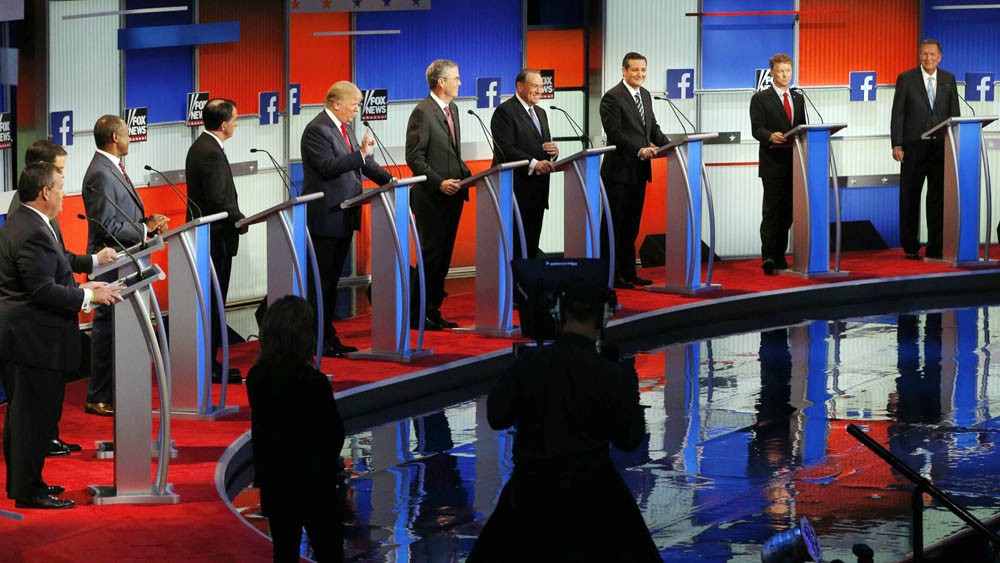
Corporations, billionaires and interest groups choose their White House candidate and manoeuvre to buy as much of politicians as they can

In this money war, billionaire-backed Super Political Action Committees (Super PACs) choose their White House candidate and manoeuvre to buy as much of the election as they can. For the ‘November 2016 elections,’ Super PACs are already doing the groundwork to potentially buy the next presidency, the Senate and House leadership.
In America, political parties need billions of dollars for contesting general elections. Elections in the US are a long haul affair. Primary election season and general election season, culminating in the contest for the White House seat, stretch over months.
Candidates need money for the long election process. If funds run out, without even the first vote being cast, a candidate has no choice but to quit the race, as did Texas former governor Perry recently.
According to conservative estimates, both the Democrats and the Republicans may have to spend more than two billion dollars each for 2015-2016 election cycle.
Since 1976 elections, eligible candidates for the presidential elections are using public funds in the primary and general election campaigns; while major parties are using public funds to pay for their nominating conventions. Each major political party is entitled to US$ four million plus cost-of-living-adjustment (COLA) to finance its national convention that nominates the candidates for the offices of President and Vice-President. Using 1974 as the base year, the US Labour Department annually calculates the COLA.
However, a presidential candidate must establish eligibility by showing broad-based public support. Donations by Political Action Committees (PACs) are not restricted/matchable. A PAC is a private special interests group organised to elect or defeat government officials in order to promote legislation, often supporting the interests of the group.
But, those candidates who receive public funding must agree to limits on campaign funding, as laid down by the Federal Election Commission Act (FECA) and endorsed by the Supreme Court. If they do not wish to receive state funding, presidential candidates are free to spend as much as they want. In addition, in a presidential election, both the Republican and the Democratic candidates receive a grant of US$ 20 million plus cost-of-living-adjustment (COLA) to cover overall expenses of their general election campaigns. Third party presidential candidates are also entitled to receive some public funds after the general elections if they receive at least five per cent of the popular votes. Since no public subsidy exists for the US congressional elections, the candidates for the Senate and the House of Representatives are free to spend as much money as they want.
Though presidential election is scheduled to be held in November, 2016, the overstretched primary election season and general election season has virtually become a war of dollars.
In this war of money, the billionaires-backed Super PACs choose the candidate and manoeuvre to buy as much of the election as they can. For the ‘November 2016 elections,’ the billionaires and special interest groups are already doing the groundwork to potentially buy the next presidency, the Senate and House leadership. If at the start of an election season, candidates are seen scrambling to find donors to back their campaign instead of focusing on the electorate or trying to attract voters, one should not, therefore, be surprised.
In 2010, the US Supreme Court allowed Super PACs to be formed, stating that corporations were people and by that virtue could participate in the electoral process by giving unlimited amounts of money to candidates or for running election campaigns as long as they are not the ones spending the money themselves.
The candidates can get their friends or relatives to set up a Super PAC in their support. The Super PAC thus established can raise unlimited amounts of money without having to file who the donors are, and also spend the money the way they deem appropriate for running the campaign in support of the candidate of their choice. Sometimes, these Super PACs even run negative campaigns, aimed at tarnishing the image of the rival candidate or political party. Since the candidate that a Super PAC supports does not himself have any role to play in doing so, he can always deny having any hand in it.
It is generally believed that super donors, like Adelson, Koch Brothers, Mercer and Freiss, could spend million of dollars for any campaign. It may be recalled that Adelson single-handedly financed Benjamin Netanyahu’s election campaign in Israel. For the 2015-2016 election, he has reportedly made it mandatory for all Republican hopefuls to adopt a strong pro-Israel posture, if they are to get money from him.
Similarly, Freiss has backed strong Evangelical values to the point where other religions are seen as a threat to the American way of life. Earlier, he did so through rhetoric Rick Santorum pushed through 2012 election cycle.
Republican Party’s front-runner Donald Trump, through his provocative comments on immigration and other issues, has offended many Americans. But, nevertheless, so far he appears to be dominating the campaign and his poll numbers appear to be steadily climbing up.
However, US President Barack Obama believes that Trump, the front-runner of their rival Republican Party, has no chance of becoming the next President of the US. Obama condemned the logic of ‘saying clearly inflammatory things and then saying ‘Well that’s not what I meant.’ "Leadership is not fanning the flames of intolerance and then acting all surprised when a fire breaks out," Obama added during a speech to the Latino political leaders in the first week of October, this year.
Given the situation, one should not be, at all, surprised if corporations/billionaires/interest groups backed Super PACs control the discussion and rhetoric throughout the election process.